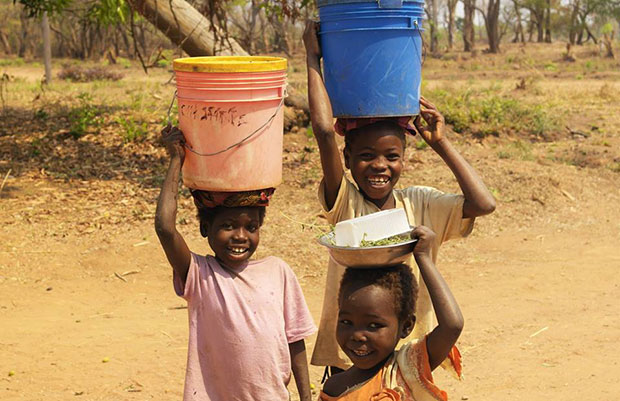
Addressing Poverty through Clean Water
It’s impossible to imagine cooking with — let alone drinking — water from the toilet. According to the United Nations, 1.8 billion people today rely on a source of drinking water contaminated with human or animal waste — which drastically increases their risk of contracting cholera, dysentery, typhoid and polio. This is one of many reasons why Salesian missionaries continue to prioritize water projects in every community in every country in which they serve.
“Unsafe drinking water is inextricably linked to extreme poverty,” says Father Mark Hyde, director of Salesian Missions, who notes that — in addition to health — it negatively affects education, income and even safety. “Children who are ill lose precious time in school,” he explains. “Parents who are ill are less able to earn an income. And women and children, upon whom the primary burden for water collection falls, lose hours and days at a time searching for a potable source.”
“Therefore,” he continues, “if we are to effectively address the conditions of poverty, and help children and families overcome it, we must introduce sustainable models for delivering clean water to communities who need it.”
On March 22, Salesian Missions joined the international community in celebrating World Water Day — an annual event highlighting the need for fresh, clean water. With so many people lacking access to improved water sources, compounded by the very real threats posed by climate change and irregular rainfall, this need is particularly urgent — and is one Salesian missionaries are working hard to fulfill, one project at a time.
Recently, missionaries in Lufubu, Zambia replaced 200 meters of PVC piping they depended upon to bring fresh, clean water to their agricultural school there.
Missionaries first established the school at the request of the Zambian government, who recognized the urgency of providing an alternative, sustainable source of food for members of the community. Having long relied on fishing for their daily meals, villagers had depleted local waterways and were in imminent danger of food insecurity. At the school, students learn to grow vegetables and raise farm animals on individual plots of land for their own personal use. In order to irrigate their crops, students use water from a nearby river.
Unfortunately, the pipe had fallen into disrepair — threatening not only the crops, but the students’ access to fresh, clean water for drinking and washing. While some water made it from a borehole to the storage tank, it fell far short of enough. Thanks to the generous support of our donors, the replacement pipe arrived quickly, preventing significant impact on the students’ crops and health.
“In Lufubu, our missionaries are teaching the skills students need to become self-sufficient — and to bring those skills into the community,” says Fr. Mark. “Access to clean water is crucial to these efforts, which promise to address some of the underlying conditions of poverty there. We are grateful to our many friends who made this possible.”
This is just one example of the many water-related projects our missionaries are currently leading around the world. For more information on how we are working to address this priority, please click here.
Our mission brings fresh, clean water to people who need it most. What’s your mission?

